全新版大学英语第二版综合教程2课文
全新版大学英语(第二版)综合教程2课文翻译
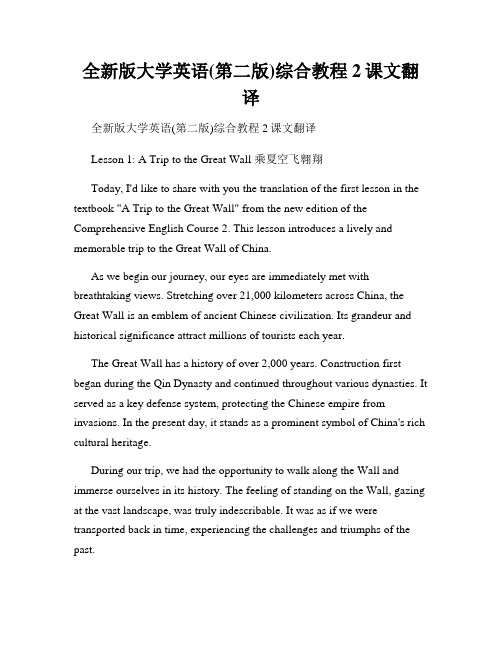
全新版大学英语(第二版)综合教程2课文翻译全新版大学英语(第二版)综合教程2课文翻译Lesson 1: A Trip to the Great Wall 乘夏空飞翱翔Today, I'd like to share with you the translation of the first lesson in the textbook "A Trip to the Great Wall" from the new edition of the Comprehensive English Course 2. This lesson introduces a lively and memorable trip to the Great Wall of China.As we begin our journey, our eyes are immediately met with breathtaking views. Stretching over 21,000 kilometers across China, the Great Wall is an emblem of ancient Chinese civilization. Its grandeur and historical significance attract millions of tourists each year.The Great Wall has a history of over 2,000 years. Construction first began during the Qin Dynasty and continued throughout various dynasties. It served as a key defense system, protecting the Chinese empire from invasions. In the present day, it stands as a prominent symbol of China's rich cultural heritage.During our trip, we had the opportunity to walk along the Wall and immerse ourselves in its history. The feeling of standing on the Wall, gazing at the vast landscape, was truly indescribable. It was as if we were transported back in time, experiencing the challenges and triumphs of the past.The Wall's architectural features are truly remarkable. Its solid structure is built from layers of brick, stone, and other materials, providing stability and strength. Along the Wall, there are watchtowers strategically located to ensure timely communication and defense.Not only is the Great Wall a historical treasure, but it also offers stunning natural scenery. The Wall winds through mountains, valleys, and even deserts, offering breathtaking views at every turn. We were captivated by the beauty of the surrounding landscape, enhancing our overall experience.Furthermore, the Great Wall has become a symbol of unity and perseverance. From the hands of countless laborers who dedicated their lives to its construction, the Wall stands as a testament to human determination and ambition. It serves as a reminder that through unity and hard work, great achievements can be made.In conclusion, our trip to the Great Wall was a truly unforgettable experience. It allowed us to appreciate the historical significance, magnificent architecture, and natural beauty that the Wall embodies. It taught us valuable lessons about the importance of preserving and cherishing our cultural heritage. It is an experience we will cherish for a lifetime.Through the translation of this lesson, we hope to inspire more people to explore and appreciate the rich history and cultural wonders of the Great Wall. Let us continue to celebrate and protect this iconic symbol of China's greatness.。
全新版大学英语第二版综合教程2第二单元课文翻译
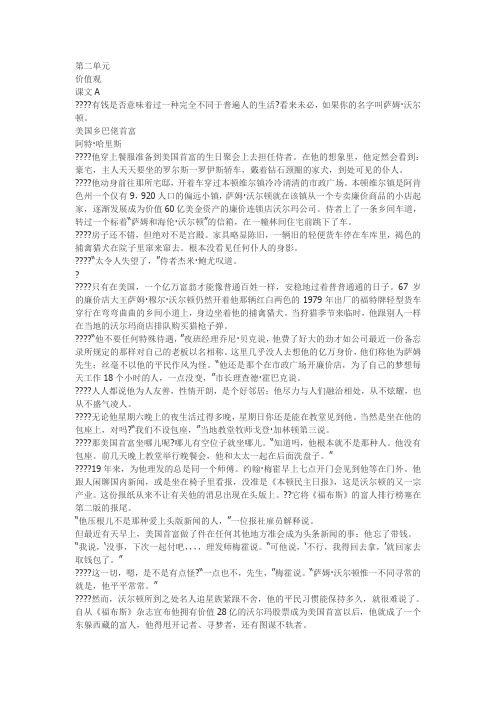
第二单元价值观课文A有钱是否意味着过一种完全不同于普遍人的生活?看来未必,如果你的名字叫萨姆·沃尔顿。
美国乡巴佬首富阿特·哈里斯他穿上餐服准备到美国首富的生日聚会上去担任侍者。
在他的想象里,他定然会看到:豪宅,主人天天要坐的罗尔斯一罗伊斯轿车,戴着钻石颈圈的家犬,到处可见的仆人。
他动身前往那所宅邸,开着车穿过本顿维尔镇冷冷清清的市政广场。
本顿维尔镇是阿肯色州一个仅有9,920人口的偏远小镇,萨姆·沃尔顿就在该镇从一个专卖廉价商品的小店起家,逐渐发展成为价值60亿美金资产的廉价连锁店沃尔玛公司。
侍者上了一条乡间车道,转过一个标着“萨姆和海伦·沃尔顿”的信箱,在一幢林间住宅前跳下了车。
房子还不错,但绝对不是宫殿。
家具略显陈旧,一辆旧的轻便货车停在车库里,褐色的捕禽猎犬在院子里窜来窜去。
根本没看见任何仆人的身影。
“太令人失望了,”侍者杰米·鲍尤叹道。
只有在美国,一个亿万富翁才能像普通百姓一样,安稳地过着普普通通的日子。
67岁的廉价店大王萨姆·穆尔·沃尔顿仍然开着他那辆红白两色的1979年出厂的福特牌轻型货车穿行在弯弯曲曲的乡间小道上,身边坐着他的捕禽猎犬。
当狩猎季节来临时,他跟别人一样在当地的沃尔玛商店排队购买猎枪子弹。
“他不要任何特殊待遇,”夜班经理乔尼·贝克说,他费了好大的劲才如公司最近一份备忘录所规定的那样对自己的老板以名相称。
这里几乎没人去想他的亿万身价,他们称他为萨姆先生;丝毫不以他的平民作风为怪。
“他还是那个在市政广场开廉价店,为了自己的梦想每天工作18个小时的人,一点没变,”市长理查德·霍巴克说。
人人都说他为人友善,性情开朗,是个好邻居;他尽力与人们融洽相处,从不炫耀,也从不盛气凌人。
无论他星期六晚上的夜生活过得多晚,星期日你还是能在教堂见到他。
当然是坐在他的包座上,对吗?“我们不设包座,”当地教堂牧师戈登·加林顿第三说。
全新版大学英语[第二版]综合教程2课文翻译
![全新版大学英语[第二版]综合教程2课文翻译](https://img.taocdn.com/s3/m/53e72617dd36a32d7375818a.png)
Unit 1Text AHoward Gardner, a professor of education at Harvard University, reflects on a visit to China and gives his thoughts on different approaches to learning in China and the West.哈佛大学教育学教授霍华德·加德纳回忆其中国之行,阐述他对中西方不同的学习方式的看法。
Learning, Chinese-StyleHoward Gardner 1 For a month in the spring of 1987, my wife Ellen and I lived in the bustling eastern Chinese city of Nanjing with our 18-month-old son Benjamin while studying arts education in Chinese kindergartens and elementary schools. But one of the most telling lessons Ellen and I got in the difference between Chinese and American ideas of education came not in the classroom but in the lobby of the Jinling Hotel where we stayed in Nanjing.中国式的学习风格霍华德·加德纳1987年春,我和妻子埃伦带着我们18个月的儿子本杰明在繁忙的中国东部城市南京住了一个月,同时考察中国幼儿园和小学的艺术教育情况。
然而,我和埃伦获得的有关中美教育观念差异的最难忘的体验并非来自课堂,而是来自我们在南京期间寓居的金陵饭店的大堂。
全新版大学英语[第二版]综合教程2课文翻译
![全新版大学英语[第二版]综合教程2课文翻译](https://img.taocdn.com/s3/m/53e72617dd36a32d7375818a.png)
Unit 1Text AHoward Gardner, a professor of education at Harvard University, reflects on a visit to China and gives his thoughts on different approaches to learning in China and the West.哈佛大学教育学教授霍华德·加德纳回忆其中国之行,阐述他对中西方不同的学习方式的看法。
Learning, Chinese-StyleHoward Gardner 1 For a month in the spring of 1987, my wife Ellen and I lived in the bustling eastern Chinese city of Nanjing with our 18-month-old son Benjamin while studying arts education in Chinese kindergartens and elementary schools. But one of the most telling lessons Ellen and I got in the difference between Chinese and American ideas of education came not in the classroom but in the lobby of the Jinling Hotel where we stayed in Nanjing.中国式的学习风格霍华德·加德纳1987年春,我和妻子埃伦带着我们18个月的儿子本杰明在繁忙的中国东部城市南京住了一个月,同时考察中国幼儿园和小学的艺术教育情况。
然而,我和埃伦获得的有关中美教育观念差异的最难忘的体验并非来自课堂,而是来自我们在南京期间寓居的金陵饭店的大堂。
全新版大学英语综合教程2课文翻译及课后答案(全)
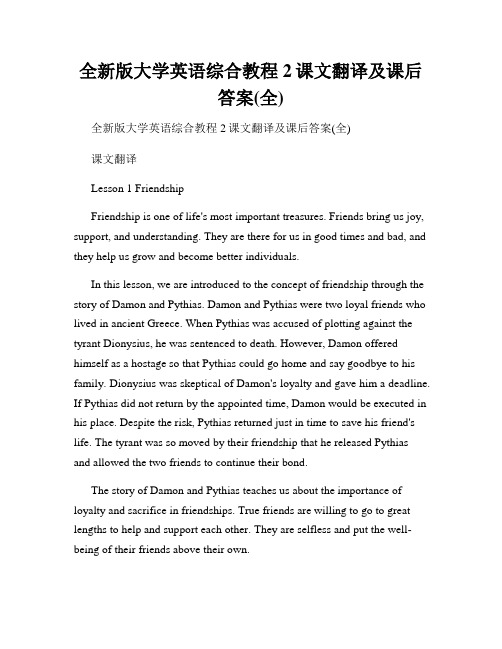
全新版大学英语综合教程2课文翻译及课后答案(全)全新版大学英语综合教程2课文翻译及课后答案(全)课文翻译Lesson 1 FriendshipFriendship is one of life's most important treasures. Friends bring us joy, support, and understanding. They are there for us in good times and bad, and they help us grow and become better individuals.In this lesson, we are introduced to the concept of friendship through the story of Damon and Pythias. Damon and Pythias were two loyal friends who lived in ancient Greece. When Pythias was accused of plotting against the tyrant Dionysius, he was sentenced to death. However, Damon offered himself as a hostage so that Pythias could go home and say goodbye to his family. Dionysius was skeptical of Damon's loyalty and gave him a deadline. If Pythias did not return by the appointed time, Damon would be executed in his place. Despite the risk, Pythias returned just in time to save his friend's life. The tyrant was so moved by their friendship that he released Pythias and allowed the two friends to continue their bond.The story of Damon and Pythias teaches us about the importance of loyalty and sacrifice in friendships. True friends are willing to go to great lengths to help and support each other. They are selfless and put the well-being of their friends above their own.Friendship is not only based on loyalty and sacrifice but also on trust and understanding. Friends should be able to confide in each other and know that their secrets are safe. They should also be able to communicate openly and honestly, even when it's difficult. When trust and understanding exist within a friendship, it becomes a safe haven where individuals can be themselves without fear of judgment.Lesson 2 SuccessSuccess means different things to different people. For some, success is measured by wealth and material possessions. For others, success is achieving personal goals and finding fulfillment in life.This lesson introduces us to the story of Jack and the Beanstalk. Jack, a poor boy, was given magic beans in exchange for his family's cow. These beans grew into a giant beanstalk that reached the sky. Jack bravely climbed the beanstalk and discovered a giant's castle where he found treasures and riches beyond imagination. Jack's journey represents the pursuit of success and the willingness to take risks.Success requires determination, hard work, and a positive mindset. It involves setting goals and working tirelessly to achieve them. Along the way, there may be obstacles and setbacks, but successful individuals persevere and stay focused on their objectives.Success is not solely measured by material wealth but also by personal growth and self-fulfillment. It's about finding happiness and contentment in one's achievements and embracing the journey rather than just the destination.课后答案Lesson 1 Friendship1. What is one of life's most important treasures?- Friendship.2. What do friends bring us?- Joy, support, and understanding.3. Who were Damon and Pythias?- They were two loyal friends who lived in ancient Greece.4. What happened to Pythias?- He was accused of plotting against the tyrant Dionysius and was sentenced to death.5. What did Damon do to help Pythias?- Damon offered himself as a hostage so that Pythias could go home and say goodbye to his family.6. What did Dionysius do to test Damon's loyalty?- He gave Damon a deadline. If Pythias did not return by the appointed time, Damon would be executed in his place.7. Did Pythias return in time?- Yes, Pythias returned just in time to save his friend's life.8. How did the tyrant react to Damon and Pythias' friendship?- The tyrant was moved by their friendship and released Pythias, allowing the two friends to continue their bond.Lesson 2 Success1. How do different people define success?- Different people define success in different ways. For some, it's measured by wealth and material possessions. For others, it's about achieving personal goals and finding fulfillment in life.2. What did Jack receive in exchange for his family's cow?- Jack received magic beans.3. What did the magic beans grow into?- The magic beans grew into a giant beanstalk that reached the sky.4. What did Jack find in the giant's castle?- Jack found treasures and riches beyond imagination in the giant's castle.5. What qualities are required for success?- Determination, hard work, and a positive mindset are required for success.6. What should individuals do when facing obstacles and setbacks?- Successful individuals should persevere and stay focused on their objectives when facing obstacles and setbacks.7. How should success be measured?- Success should not only be measured by material wealth but also by personal growth and self-fulfillment. It's about finding happiness and contentment in one's achievements and embracing the journey.注意:以上仅为翻译示例及课后答案,具体课文内容请参照教材。
全新版大学英语第二版综合教程2课文译文
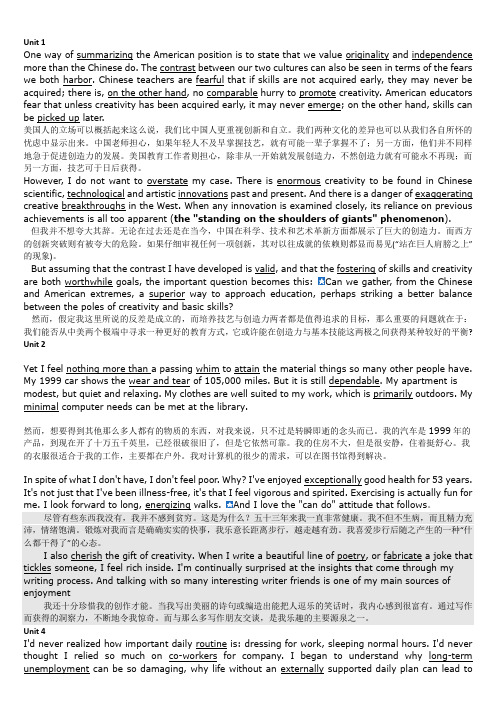
Unit 1One way of summarizing the American position is to state that we value originality and independence more than the Chinese do. The contrast between our two cultures can also be seen in terms of the fears we both harbor. Chinese teachers are fearful that if skills are not acquired early, they may never be acquired; there is, on the other hand, no comparable hurry to promote creativity. American educators fear that unless creativity has been acquired early, it may never emerge; on the other hand, skills can be picked up later.美国人的立场可以概括起来这么说,我们比中国人更重视创新和自立。
我们两种文化的差异也可以从我们各自所怀的忧虑中显示出来。
中国老师担心,如果年轻人不及早掌握技艺,就有可能一辈子掌握不了;另一方面,他们并不同样地急于促进创造力的发展。
美国教育工作者则担心,除非从一开始就发展创造力,不然创造力就有可能永不再现;而另一方面,技艺可于日后获得。
However, I do not want to overstate my case. There is enormous creativity to be found in Chinese scientific, technological and artistic innovations past and present. And there is a danger of exaggerating creative breakthroughs in the West. When any innovation is examined closely, its reliance on previous achievements is all too apparent (the "standing on the shoulders of giants" phenomenon).但我并不想夸大其辞。
全新版大学英语综合教程-2-课文电子书
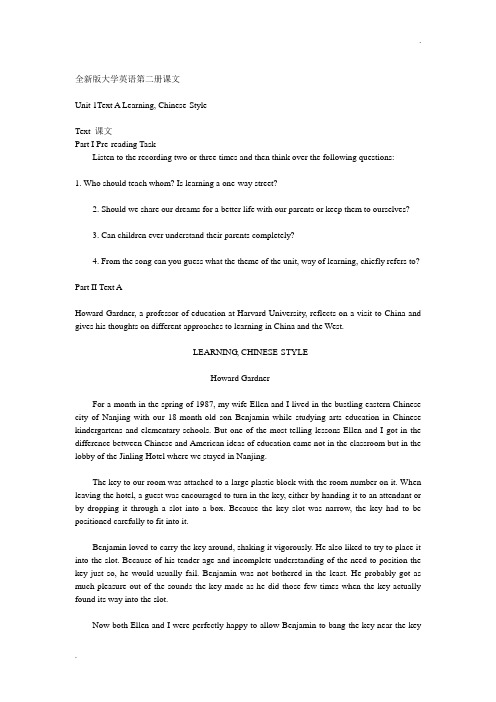
全新版大学英语第二册课文Unit 1Text A Learning, Chinese-StyleText 课文Part I Pre-reading TaskListen to the recording two or three times and then think over the following questions:1. Who should teach whom? Is learning a one-way street?2. Should we share our dreams for a better life with our parents or keep them to ourselves?3. Can children ever understand their parents completely?4. From the song can you guess what the theme of the unit, way of learning, chiefly refers to?Part II Text AHoward Gardner, a professor of education at Harvard University, reflects on a visit to China and gives his thoughts on different approaches to learning in China and the West.LEARNING, CHINESE-STYLEHoward GardnerFor a month in the spring of 1987, my wife Ellen and I lived in the bustling eastern Chinese city of Nanjing with our 18-month-old son Benjamin while studying arts education in Chinese kindergartens and elementary schools. But one of the most telling lessons Ellen and I got in the difference between Chinese and American ideas of education came not in the classroom but in the lobby of the Jinling Hotel where we stayed in Nanjing.The key to our room was attached to a large plastic block with the room number on it. When leaving the hotel, a guest was encouraged to turn in the key, either by handing it to an attendant or by dropping it through a slot into a box. Because the key slot was narrow, the key had to be positioned carefully to fit into it.Benjamin loved to carry the key around, shaking it vigorously. He also liked to try to place it into the slot. Because of his tender age and incomplete understanding of the need to position the key just so, he would usually fail. Benjamin was not bothered in the least. He probably got as much pleasure out of the sounds the key made as he did those few times when the key actually found its way into the slot.Now both Ellen and I were perfectly happy to allow Benjamin to bang the key near the keyslot. His exploratory behavior seemed harmless enough. But I soon observed an interesting phenomenon. Any Chinese staff member nearby would come over to watch Benjamin and, noting his lack of initial success, attempt to assist. He or she would hold onto Benjamin's hand and, gently but firmly, guide it directly toward the slot, reposition it as necessary, and help him to insert it. The "teacher" would then smile somewhat expectantly at Ellen or me, as if awaiting a thank you — and on occasion would frown slightly, as if considering us to be neglecting our parental duties.I soon realized that this incident was directly relevant to our assigned tasks in China: to investigate the ways of early childhood education (especially in the arts), and to throw light on Chinese attitudes toward creativity. And so before long I began to introduce the key-slot anecdote into my discussions with Chinese educators.TWO DIFFERENT W AYS TO LEARNWith a few exceptions my Chinese colleagues displayed the same attitude as the staff at the Jinling Hotel. Since adults know how to place the key in the key slot, which is the ultimate purpose of approaching the slot, and since the child is neither old enough nor clever enough to realize the desired action on his own, what possible gain is achieved by having him struggle? He may well get frustrated and angry — certainly not a desirable outcome. Why not show him what to do? He will be happy, he will learn how to accomplish the task sooner, and then he can proceed to more complex activities, like opening the door or asking for the key—both of which accomplishments can (and should) in due course be modeled for him as well.We listened to such explanations sympathetically and explained that, first of all, we did not much care whether Benjamin succeeded in inserting the key into the slot. He was having a good time and was exploring, two activities that did matter to us. But the critical point was that, in the process, we were trying to teach Benjamin that one can solve a problem effectively by oneself. Such self-reliance is a principal value of child rearing in middle-class America. So long as the child is shown exactly how to do something — whether it be placing a key in a key slot, drawing a hen or making up for a misdeed — he is less likely to figure out himself how to accomplish such a task. And, more generally, he is less likely to view life —as Americans do —as a series of situations in which one has to learn to think for oneself, to solve problems on one's own and even to discover new problems for which creative solutions are wanted.TEACHING BY HOLDING HIS HANDIn retrospect, it became clear to me that this incident was indeed key — and key in more than one sense. It pointed to important differences in the educational and artistic practices in our two countries.When our well-intentioned Chinese observers came to Benjamin's rescue, they did not simply push his hand down clumsily or uncertainly, as I might have done. Instead, they guided him with extreme facility and gentleness in precisely the desired direction. I came to realize that these Chinese were not just molding and shaping Benjamin's performance in any old manner: In the bestChinese tradition, they were ba zhe shoujiao — "teaching by holding his hand" — so much so that he would happily come back for more.The idea that learning should take place by continual careful shaping and molding applies equally to the arts. Watching children at work in a classroom setting, we were astonished by their facility. Children as young as 5 or 6 were painting flowers, fish and animals with the skill and confidence of an adult; calligraphers 9 and 10 years old were producing works that could have been displayed in a museum. In a visit to the homes of two of the young artists, we learned from their parents that they worked on perfecting their craft for several hours a day.CREATIVITY FIRST?In terms of attitudes to creativity there seems to be a reversal of priorities: young Westerners making their boldest departures first and then gradually mastering the tradition; and young Chinese being almost inseparable from the tradition, but, over time, possibly evolving to a point equally original.One way of summarizing the American position is to state that we value originality and independence more than the Chinese do. The contrast between our two cultures can also be seen in terms of the fears we both harbor. Chinese teachers are fearful that if skills are not acquired early, they may never be acquired; there is, on the other hand, no comparable hurry to promote creativity. American educators fear that unless creativity has been acquired early, it may never emerge; on the other hand, skills can be picked up later.However, I do not want to overstate my case. There is enormous creativity to be found in Chinese scientific, technological and artistic innovations past and present. And there is a danger of exaggerating creative breakthroughs in the West. When any innovation is examined closely, its reliance on previous achievements is all too apparent (the "standing on the shoulders of giants" phenomenon ).But assuming that the contrast I have developed is valid, and that the fostering of skills and creativity are both worthwhile goals, the important question becomes this: Can we gather, from the Chinese and American extremes, a superior way to approach education, perhaps striking a better balance between the poles of creativity and basic skills?(1182 words)Unit 2 Text A The Richest Man In America, Down HomeText 课文Part I Pre-reading TaskListen to the recording two or three times and then think over the following questions:1. Who is it about?2. What happened to him one day?3. Do you think it was worthwhile to walk two or three miles to pay back the six and a quarter cents?4. Is the story related to the theme of the unit — values?The following words in the recording may be new to you:dismayn. 沮丧,失望disturbvt. 使不安conscientiousa. 认真的,尽职的Part II Text ADoes being rich mean you live a completely different life from ordinary people? Not, it seems, if your name is Sam Walton.THE RICHEST MAN IN AMERICA, DOWN HOMEArt HarrisHe put on a dinner jacket to serve as a waiter at the birthday party of The Richest Man in America. He imagined what surely awaited: a mansion, a "Rolls-Royce for every day of the week," dogs with diamond collars, servants everywhere.Then he was off to the house, wheeling past the sleepy town square in Bentonville, a remote Arkansas town of 9,920, where Sam Walton started with a little dime store that grew into a $6 billion discount chain called Wal-Mart. He drove down a country road, turned at a mailbox marked "Sam and Helen Walton," and jumped out at a house in the woods.It was nice, but no palace. The furniture appeared a little worn. An old pickup truck sat in the garage and a muddy bird dog ran about the yard. He never spotted any servants."It was a real disappointment," sighs waiter Jamie Beaulieu.Only in America can a billionaire carry on like plain folks and get away with it. And the 67-year-old discount king Sam Moore Walton still travels these windy back roads in his 1979 Ford pickup, red and white, bird dogs by his side, and, come shooting season, waits in line like everyone else to buy shells at the local Wal-Mart."He doesn't want any special treatment," says night manager Johnny Baker, who struggles to call the boss by his first name as a recent corporate memo commands. Few here think of his billions; they call him "Mr. Sam" and accept his folksy ways. "He's the same man who opened his dime store on the square and worked 18 hours a day for his dream," says Mayor Richard Hoback.By all accounts, he's friendly, cheerful, a fine neighbor who does his best to blend in, never flashy, never throwing his weight around.No matter how big a time he had on Saturday night, you can find him in church on Sunday. Surely in a reserved seat, right? "We don't have reserved seats," says Gordon Garlington III, pastor of the local church.So where does The Richest Man in America sit? Wherever he finds a seat. "Look, he's just not that way. He doesn't have a set place. At a church supper the other night, he and his wife were in back washing dishes."For 19 years, he's used the same barber. John Mayhall finds him waiting when he opens up at 7 a.m. He chats about the national news, or reads in his chair, perhaps the Benton County Daily Democrat, another Walton property that keeps him off the front page. It buried the Forbes list at the bottom of page 2."He's just not a front-page person," a newspaper employee explains.But one recent morning, The Richest Man in America did something that would have made headlines any where in the world: He forgot his money. "I said, 'Forget it, take care of it next time,'" says barber Mayhall. "But he said, 'No, I'll get it,' and he went home for his wallet."Wasn't that, well, a little strange? "No sir," says Mayhall, "the only thing strange about Sam Walton is that he isn't strange."But just how long Walton can hold firm to his folksy habits with celebrity hunters keeping following him wherever he goes is anyone's guess. Ever since Forbes magazine pronounced him America's richest man, with $2.8 billion in Wal-Mart stock, he's been a rich man on the run, steering clear of reporters, dreamers, and schemers."He may be the richest by Forbes rankings," says corporate affairs director Jim V on Gremp,"but he doesn't know whether he is or not — and he doesn't care. He doesn't spend much. He owns stock, but he's always left it in the company so it could grow. But the real story in his mind is the success achieved by the 100,000 people who make up the Wal-Mart team."He's usually back home for Friday sales meetings, or the executive pep rally Saturday morning at 7 a.m., when Walton, as he does at new store openings, is liable to jump up on a chair and lead everyone in the Wal-Mart cheer: "Give me a W! Give me an A! Give me an L! Louder!"And louder they yell. No one admits to feeling the least bit silly. It's all part of the Wal-Mart way of life as laid down by Sam: loyalty, hard work, long hours; get ideas into the system from the bottom up, Japanese-style; treat your people right; cut prices and margins to the bone and sleep well at night. Employees with one year on board qualify for stock options, and are urged to buy all they can.After the pep rally, there's bird hunting, or tennis on his backyard court. But his stores are always on his mind. One tennis guest managed to put him off his game by asking why a can of balls cost more in one Wal-Mart than another. It turned out to be untrue, but the move worked. Walton lost four straight games.Walton set up a college scholarship fund for employees' children, a disaster relief fund to rebuild employee homes damaged by fires, floods, tornadoes, and the like. He believed in cultivating ideas and rewarding success."He'd say, 'That fellow worked hard, let's give him a little extra,'" recalls retired president Ferold F. Arend, who was stunned at such generosity after the stingy employer he left to join Wal-Mart. "I had to change my way of thinking when I came aboard.""The reason for our success," says Walton, in a company handout, "is our people and the way they're treated and the way they feel about their company. They believe things are different here, but they deserve the credit."Adds company lawyer Jim Hendren: "I've never seen anyone yet who worked for him or was around him for any length of time who wasn't better off. And I don't mean just financially, although a lot of people are. It's just something about him —coming into contact with Sam Walton just makes you a better person."(1066 words)Unit 2 Text A Father knows BetterText 课文Part I Pre-reading TaskListen to the recording two or three times and then think over the following questions:1. What sort of a song is it?2. Who should be sitting up and taking notice? Why?3. What does the singer think of his parent's way of doing things?4. Do you agree with what he says?The following words in the recording may be new to you:roamvi. 漫游drenchvt. 使湿透prophesizev. 作预言senatorn. 参议员heedvt. 注意stallv. 拖延ragevi. 激烈地进行Part II Text AThis comedy centers around a proud father's attempts to help his children, attempts which somehow or other always end up embarrassing them. For the sake of fun it carries things to extremes, but nearly everyone can recognize something of themselves and their parents in it.FATHER KNOWS BETTERMarsh CassadyCHARACTERS: FATHER; MOTHER; HEIDI, 14; DIANE, 17; SEAN, 16; RESTAURANT MANAGER, 20s; MRS. HIGGINS.SETTING: Various locations including a fast-food restaurant, the Thompson family dining room, and an office at a high school.ATRISE: As the lights come up, HEIDI enters and crosses Down Right to the edge of the stage. SEAN and DIANE enter and cross Down Left to the edge of the stage. They listen as HEIDI addresses the audience.HEIDI: My dad's a nice man. Nobody could possibly believe that he isn't. Yet he's... well, he's always doing these stupid things that end up really embarrassing one or more of us kids. One time, see, my brother wanted to buy this guitar. Been saving money for it for a long time. Then he got a job at this fast-food place, OK? Waiting tables. It was Sean's first actual job, and he was real happy about it. He figured in two or three months he'd have enough money to buy exactly the kind of guitar he wanted. Mom and Dad were proud of him, and well, OK, he's my big brother, and he's always pulling these dumb things on me. But, well, I was proud of him too. You know what happened? I hate to tell you because:SEAN, DIANE and HEIDI: (In unison) Father knows better!(The lights come Up Left on the fast-food restaurant where SEAN works. It consists of a counter and a couple of small tables. The MAN-AGER stands behind the counter. SEAN is busily cleaning the tables when FATHER walks in.)MANAGER: Good evening, sir. May I help you?FATHER: Good evening.SEAN: (To himself) Oh, no!(He squats behind one of the tables trying to hide from FATHER.)FATHER: I'm looking for the manager.MANAGER: That would be me, sir.FATHER: I'm Sam Thompson. My son works here.MANAGER: Oh, you're Sean's father.FATHER: Yes. It's his first job, you know. I just wanted to check that he's doing OK.MANAGER: Oh, fine. No problem.SEAN: (Spreading his hands, palms up, speaking to himself) What did I do to deserve this? Tell me what?FATHER: Hiring him was a good thing then?MANAGER: Well, yeah, I suppose so.SEAN: (Still to himself.) Go home, Dad. Go home. Go home.FATHER: I'm sure he's a good worker but a typical teenager, if you know what I mean.MANAGER: (Losing interest) I wouldn't know.FATHER: He's a good boy. And I assure you that if there are any subjects that need to be addressed, Sean and I will have a man-to-man talk.MANAGER: I don't think that will be necessary...FATHER: Oh, no problem. I'm proud of my son. Very, very proud. And I just wanted you to know that I'll do anything I can to help him through life's dangerous sea.SEAN: (Standing up and screaming) Aaaargh! Aaaargh! Aaaaaaargh!FATHER: Son, I didn't know you were here.SEAN: It's where I work, Dad.FATHER: Of course. I mean, I didn't see you.SEAN: I can't imagine why.FATHER: Your manager and I were just having a nice chat.(DIANE enters Down Left just as HEIDI enters Down Right. They look at SEAN and FATHER.)SEAN, DIANE, HEIDI: (In unison) Father, you know better than that.(The lights quickly fade to black and then come up a second or two later. SEAN stands alone at the Down Right edge of the stage. HEIDI and DIANE cross to Down Left edge of the stage.)SEAN: If that sort of thing happened only once in a while, it wouldn't be so bad. Overall, I wouldn't want to trade my dad for anyone else's. He loves us kids and Mom too. But I think that's sometimes the problem. He wants to do things for us, things he thinks are good. But he needs to give them more thought because:SEAN, HEIDI and DIANE: (In unison) Father knows better!(The lights fade to black and come up on the Center Stage area where FATHER and the three children are seated around the dining room table. MOTHER enters carrying a dish, which she sets on the table. FATHER quickly rises and pulls out her chair. She sits. The family starts eating dinner.)FATHER: I have a surprise for you, Diane.DIANE: (Knows it can't be good.) You have... a surprise?MOTHER: Well, whatever it is, dear, don't keep us in suspense.FATHER: Well, you know, Dan Lucas and I work together?DIANE: Kyle's father?MOTHER: Don't interrupt, dear, your father is trying to tell you something.HEIDI: (Stage whisper to SEAN) Something Diane won't want to know, I'll bet.SEAN: (Whispering to HEIDI) Whatever would make you think that?MOTHER: Sean, dear. Heidi, sweetheart, don't distract your father.SEAN and HEIDI: (Simultaneously) Sorry, Mom.FATHER: Now then. As I was saying, I know how much you like young Kyle.DIANE: Father!FATHER: It's true, isn't it? Didn't I hear you tell your mother that you wish Kyle would ask you to the senior prom?SEAN: Uh-oh!HEIDI: Oops!MOTHER: Please, children, please. Your father is trying to speak.DIANE: (Through clenched teeth, the words are in a monotone and evenly spaced.) Yes-I-said-that-why-are-you-asking?FATHER: Well then.DIANE: (Becoming hysterical) "Well then" what?!FATHER: What did I say? Did I say something wrong?HEIDI: (To SEAN) Not yet, he didn't.SEAN: (To HEIDI) But you know it's coming.MOTHER: Children, please. Do give your father the respect he deserves.HEIDI and SEAN: (Rolling their eyes) Yes, Mother.FATHER: Well, today I saw Dan and asked if he'd like to go to lunch at that French restaurant on Third Street. You know the one, Mother.MOTHER: Well, yes, I believe I do.FATHER: My treat, I told him. And, of course, he was glad to accept.MOTHER: Why wouldn't he be?FATHER: (Somewhat surprised) Well, yes.DIANE: What-has-this-to-do-with me?!MOTHER: Diane, sometimes I just don't understand your behavior. I try my best.DIANE: (Very short with her) I'm sorry.MOTHER: Thank you, Diane. (To FATHER) Please do go on, dear.FATHER: As I said —HEIDI: We know what you said, Daddy.FATHER: Er... uh, what's that?SEAN: She said, "We know what you said, Daddy."FATHER: Yes, yes, of course.MOTHER: Do get on with it, dear. I've made the most glorious dessert. An old recipe handed down to me by my great Aunt Hilda —DIANE: Mother, please!MOTHER: Yes, dear?(DIANE shakes her head and lets her body fall against the back of the chair.)FATHER: At any rate, Dan's a nice guy. Never knew him well. Found we have a lot of the same interests. Our families, our community, global peace, human welfare.HEIDI: (Mumbling to herself) That narrows it down, all right.SEAN: Father?FATHER: Yes, son?SEAN: I do believe Diane would like to know the surprise.DIANE: (Breathing hard as if exhausted, she turns to SEAN, nodding her head up and down repeatedly.) Thank you, Sean. I owe you one.FATHER: Well, yes. Here it is then. I told Dan of your interest in his son.DIANE: You what?MOTHER: Diane, what has come over you? I just don't understand the younger generation. Why back in my day —DIANE: Mother, please!MOTHER: What, what? What?HEIDI: Mother, I believe she wants Father to continue.SEAN: (To himself) Get this over with, more likely.DIANE: Daddy, please, tell me. Now. Right away. What did you say, Daddy? Please. Tell me, what did you tell Mr. Lucas? Tell me, please. Please, tell me.FATHER: Well, now, isn't this nice. It looks like my little scheme is a success. You're so eager to find out... makes a man feel as if it's all worthwhile.HEIDI: (To SEAN) Can you believe this?SEAN: (To HEIDI) Oh, sure. Can't you?FATHER: Yes, well, I told him how much you liked young Kyle, and how you'd been wishing he'd ask you to the prom.DIANE: You didn't! Tell me you didn't!FATHER: Oh, yes. Anything for my children.DIANE: (Swallowing hard) And... and —MOTHER: Diane, are you all right?DIANE: (She juts out her chin at MOTHER and quickly jerks her head around to face FATHER.) Well... what did he say?!FATHER: Well, of course, being the sort of man he is — frank, understanding, he said he'd speak to the young man, insist he give you a call.DIANE: (Angry scream!) Whaaaaaat!SEAN and HEIDI: (Together) Father, you know better than that.FATHER: I do? Yes, yes, I guess I do. I've... done it again, haven't I?(The lights quickly fade to black and then come up a second or two later. DIANE stands alone at the Down Right edge of the stage. HEIDI and SEAN enter Down Left and cross to the edge of the stage.)DIANE: Can you imagine how humiliated I was? An honor student, class president. And Father was out asking people to have their sons call and ask me to the prom! But that's dear old dad. Actually, he is a dear. He just doesn't stop to think. And it's not just one of us who've felt the heavy hand of interference. Oh, no, all three of us live in constant dread knowing that at any timedisaster can strike because:DIANE, HEIDI and SEAN: (Shouting in unison) Father knows better.(The lights fade to black and quickly come up again Stage Left where there is an executive-type desk and chair and two other chairs. Behind the desk sits MRS. HIGGINS, in charge of admitting new students to Benjamin Harrison High School. HEIDI and FATHER sit in the other chairs.)MRS. HIGGINS: So this is our new student, is it?FATHER: That's right.MRS. HIGGINS: What's your name, young lady?HEIDI: HEIDI Thompson.MRS. HIGGINS: I'm sure you'll find the students friendly. And the teachers more than willing to answer questions.FATHER: She is an exceptional young woman, you know.HEIDI: Daddy!FATHER: Very, very bright.MRS. HIGGINS: Yes, now if we can get you to fill out —FATHER: Don't know where she got her brains. Her mother, I suppose. Oh, I was bright enough. But nothing like HEIDI. All her teachers have told Mrs. Thompson — that's her mother — and me that she was just about the brightest —MRS. HIGGINS: (Interrupts as she loses her patience, though trying to be pleasant) As I said, if you have proof of vaccinations —FATHER: (Interrupts, carrying on with his line of thought) Besides being bright, she's very, very talented.HEIDI: (Twists her hands over and over in front of her chest.) Please, Daddy, don't do this.FATHER: Well, of course I will, darling. I'm proud of you. Your mother and I are proud of you. (Turns back to MRS.HIGGINS.) Why just last year, in her last year of junior high school, before we moved, Heidi placed first in the county in the annual spelling bee! Isn't that wonderful? And she plays the piano like an angel. An absolute angel.HEIDI: Daddy, please. Please, please. Daddy, I have to go to class. I want to go to class. Please let me go to class.FATHER: See what I mean? Such an eager learner. I can't imagine anyone's being more eager for knowledge than my Heidi. My little girl.MRS. HIGGINS: Yes, well, be that as it may —HEIDI: Aaargh! Aaaaargh! Aaaargh!(DIANE and SEAN enter Down Right. They look at HEIDI, FATHER, and MRS. HIGGINS.)HEIDI, DIANE and SEAN: (Shouting in unison) Daddy, you know better than that!FATHER: Er, uh, I do?(Curtain)(1912 words)Unit 4 Text A A Virtual LifeText 课文Part I Pre-reading TaskListen to the recording two or three times and then think over the following questions:1. Is the hero a student or an employee?2. What was he doing when the boss came in?3. How did he act in front of his boss?4. Can you guess what the texts in this unit are going to be about?The following words in the recording may be new to you:surfvt. (在网上)漫游log onto进入(计算机系统)unpredictablea. 不可预测的Part II Text AMaia Szalavitz, formerly a television producer, now spends her time as a writer. In this essay she explores digital reality and its consequences. Along the way, she compares the digital world to the "real" world, acknowledging the attractions of the electronic dimension.A VIRTUAL LIFEMaia SzalavitzAfter too long on the Net, even a phone call can be a shock. My boyfriend's Liverpool accent suddenly becomes impossible to interpret after his easily understood words on screen; a secretary's clipped tone seems more rejecting than I'd imagined it would be. Time itself becomes fluid —hours become minutes, or seconds stretch into days. Weekends, once a highlight of my week, are now just two ordinary days.For the last three years, since I stopped working as a television producer, I have done much of my work as a telecommuter. I submit articles and edit them via email and communicate with colleagues on Internet mailing lists. My boyfriend lives in England, so much of our relationship is also computer-assisted.If I desired, I could stay inside for weeks without wanting anything. I can order food, and manage my money, love and work. In fact, at times I have spent as long as three weeks alone at home, going out only to get mail and buy newspapers and groceries. I watched most of the endless snowstorm of'96 on TV.But after a while, life itself begins to feel unreal. I start to feel as though I've become one with my machines, taking data in, spitting them back out, just another link in the Net. Others on line report the same symptoms. We start to feel an aversion to outside forms of socializing. We have become the Net critics' worst nightmare.What first seemed like a luxury, crawling from bed to computer, not worrying about hair, and clothes and face, has become a form of escape, a lack of discipline. And once you start replacing real human contact with cyber-interaction, coming back out of the cave can be quite difficult.。
全新版大学英语综合教程2课文原文及翻译.doc
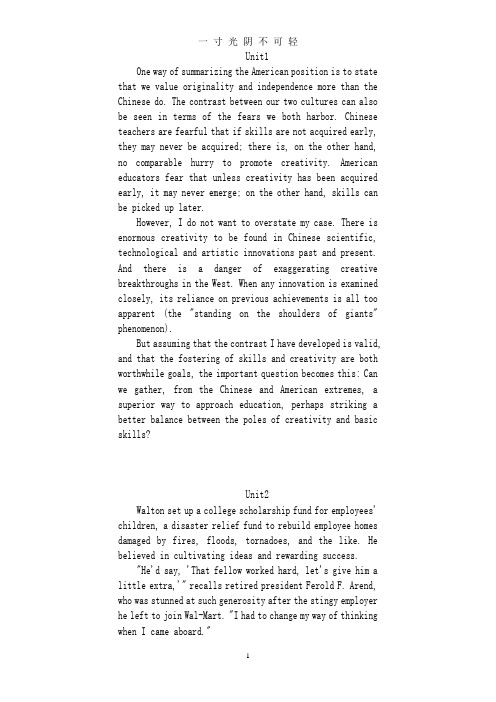
Unit1One way of summarizing the American position is to state that we value originality and independence more than the Chinese do. The contrast between our two cultures can also be seen in terms of the fears we both harbor. Chinese teachers are fearful that if skills are not acquired early, they may never be acquired; there is, on the other hand, no comparable hurry to promote creativity. American educators fear that unless creativity has been acquired early, it may never emerge; on the other hand, skills can be picked up later.However, I do not want to overstate my case. There is enormous creativity to be found in Chinese scientific, technological and artistic innovations past and present. And there is a danger of exaggerating creative breakthroughs in the West. When any innovation is examined closely, its reliance on previous achievements is all too apparent (the "standing on the shoulders of giants" phenomenon).But assuming that the contrast I have developed is valid, and that the fostering of skills and creativity are both worthwhile goals, the important question becomes this: Can we gather, from the Chinese and American extremes, a superior way to approach education, perhaps striking a better balance between the poles of creativity and basic skills?Unit2Walton set up a college scholarship fund for employees' children, a disaster relief fund to rebuild employee homes damaged by fires, floods, tornadoes, and the like. He believed in cultivating ideas and rewarding success."He'd say, 'That fellow worked hard, let's give him a little extra,'" recalls retired president Ferold F. Arend, who was stunned at such generosity after the stingy employer he left to join Wal-Mart. "I had to change my way of thinking when I came aboard.""The reason for our success," says Walton, in a company handout, "is our people and the way they're treated and the way they feel about their company. They believe things are different here, but they deserve the credit."Adds company lawyer Jim Hendren: "I've never seen anyone yet who worked for him or was around him for any length of time who wasn't better off. And I don't mean just financially, although a lot of people are. It's just something about him -- coming into contact with Sam Walton just makes you a better person."Making the journey from log cabin to White House is part of the American Dream. But when Jimmy Carter was defeated in his attempt to gain a second term as President of the United States he found himself suddenly thrown out of the White House and back in his log cabin. This is how he coped.Unit3SEAN: If that sort of thing happened only once in a while, it wouldn't be so bad. Overall, I wouldn't want to trade my dad for anyone else's. He loves us kids and Mom too. But I think that's sometimes the problem. He wants to do things for us, things he thinks are good. But he needs to give them more thought because:SEAN, HEIDI and DIANE: (In unison) Father knows better!(The lights quickly fade to black and then come up a second or two later. DIANE stands alone at the Down Right edge of the stage. HEIDI and SEAN enter Down Left and cross to the edge of the stage. )DIANE: Can you imagine how humiliated I was? An honor student, class president. And Father was out asking people to have their sons call and ask me to the prom! But that's dear old dad. Actually, he is a dear. He just doesn't stop to think. And it's not just one of us who've felt the heavy hand of interference. Oh, no, all three of us live in constant dread knowing that at any time disaster can strike because: Father knows better.Unit4I'd never realized how important daily routine is: dressing for work, sleeping normal hours. I'd never thought I relied so much on co-workers for company. I began to understand why long-term unemployment can be so damaging, why life without an externally supported daily plan can lead to higher rates of drug abuse, crime, suicide.To restore balance to my life, I force myself back into the real world. I call people, arrange to meet with the few remaining friends who haven't fled New York City. I try to at least get to the gym, so as to set apart the weekend from the rest of my week. I arrange interviews for stories, doctor's appointments -- anything to get me out of the house and connected with others.But sometimes being face to face is too much. I see a friend and her ringing laughter is intolerable -- the noise of conversation in the restaurant, unbearable. I make my excuses and flee. I re-enter my apartment and run to the computer as though it were a place of safety.I click on the modem, the once-annoying sound of the connection now as pleasant as my favorite tune. I enter my password. The real world disappears.Thought you were safe sharing secrets with Internet friends? Wait for the doorbell...Unit5The runway felt different this time. It startled him for a brief moment. Then it all hit him like a wet bale of hay. The bar was set at nine inches higher than his personal best. That's only one inch off the National record, he thought. The intensity of the moment filled his mind withanxiety. He began shaking the tension. It wasn't working. He became more tense. Why was this happening to him now, he thought. He began to get nervous. Afraid would be a more accurate description. What was he going to do? He had never experienced these feelings. Then out of nowhere, and from the deepest depths of his soul, he pictured his mother. Why now? What was his mother doing in his thoughts at a time like this? It was simple. His mother always used to tell him when you felt tense, anxious or even scared, take deep breaths.So he did. Along with shaking the tension from his legs, he gently laid his pole at his feet. He began to stretch out his arms and upper body. The light breeze that was once there was now gone. He carefully picked up his pole. He felt his heart pounding. He was sure the crowd did, too. The silence was deafening. When he heard the singing of some distant birds in flight, he knew it was his time to fly.Unit6Racing the clock every day is such an exhausting effort that when I actually have a few free moments, I tend to collapse. Mostly I sink into a chair and stare into space while I imagine how lovely life would be if only I possessed the organizational skills and the energy of my superheroines. In fact, I waste a good deal of my spare time just worrying about what other women are accomplishing in theirs. Sometimes I think that these modern fairy tales create as many problems for women as the old stories that had us biding our time for the day our prince would come.Yet superwomen tales continue to charm me. Despite my friend's warning against being taken in, despite everything I've learned, I find that I'm not only willing, but positively eager to buy that bridge she mentioned. Why? I suppose it has something to do with the appeal of an optimistic approach to life -- and the fact that extraordinary deeds have been accomplished by determinedindividuals who refused to believe that "you can't" was the final word on their dreams.Men have generally been assured that achieving their heart's desires would be a piece of cake. Women, of course, have always believed that we can't have our cake and eat it too-the old low-dream diet. Perhaps becoming a superwoman is an impossible dream for me, but life without that kind of fantasy is as unappealing as a diet with no treats.1) The young woman described to the policemen the way the man ran up to her and grabbed the bag from her hand. 2) All the people working for Sam Walton admire the way he manages Wal-Mart and the way he treats his employees. 3) The neighbors were disgusted at the way he talked to his old father.4) It's amazing the way the eight-year-old boy managed to stay so calm when he faced the emergency.1. You will find yourself penniless in a month.2. He found himself lying in a hospital ward.3. She found herself faced with the toughest job she had ever taken.4. Susan found herself in a trap from which she could not escape.1) Obviously what the speaker wanted to emphasize was the impact of these findings rather than the process that led to these findings.2) It seems that he is never bothered about what people would think about his behavior.3) The CEO never hesitates to let his employees know what he is planning for the company.4) The scientist will show the audience what a tele-operated robot can do for a family.5)Despite all this she manages to get her act together.1、She herself believed in freedom,so much so that she would rather die than live without it.2、Assuming the proposal is accepted,where are we going toget the money?3、Only by rewarding success can you bring out the best in your employess.4、It’s amazing the eight-year-old boy managed to stay so calm when he faced the emergency.5、Allen should have known better than to lend such a large sum of money to that untrustworthy cousin of his.。
全新版大学英语(第二版)综合教程2课文背诵段落原文及翻译
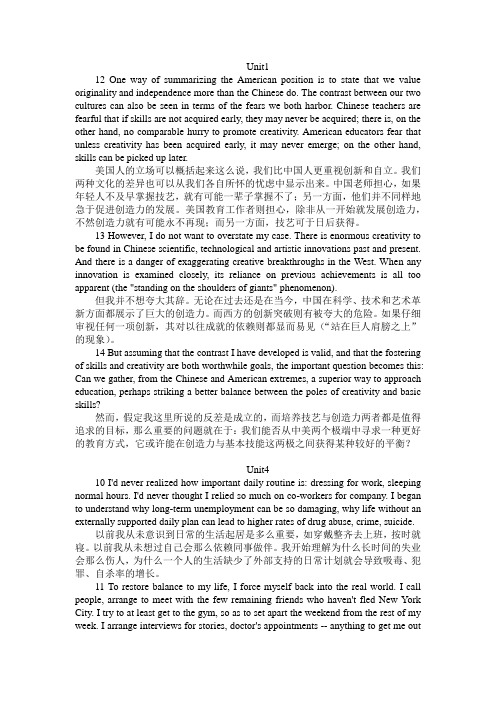
Unit112 One way of summarizing the American position is to state that we value originality and independence more than the Chinese do. The contrast between our two cultures can also be seen in terms of the fears we both harbor. Chinese teachers are fearful that if skills are not acquired early, they may never be acquired; there is, on the other hand, no comparable hurry to promote creativity. American educators fear that unless creativity has been acquired early, it may never emerge; on the other hand, skills can be picked up later.美国人的立场可以概括起来这么说,我们比中国人更重视创新和自立。
我们两种文化的差异也可以从我们各自所怀的忧虑中显示出来。
中国老师担心,如果年轻人不及早掌握技艺,就有可能一辈子掌握不了;另一方面,他们并不同样地急于促进创造力的发展。
美国教育工作者则担心,除非从一开始就发展创造力,不然创造力就有可能永不再现;而另一方面,技艺可于日后获得。
13 However, I do not want to overstate my case. There is enormous creativity to be found in Chinese scientific, technological and artistic innovations past and present. And there is a danger of exaggerating creative breakthroughs in the West. When any innovation is examined closely, its reliance on previous achievements is all too apparent (the "standing on the shoulders of giants" phenomenon).但我并不想夸大其辞。
全新版大学英语(第二版)综合教程2课文背诵段落原文及翻译

Unit59The runway felt different this time. It startled him for a brief moment. Then it all hit him like a wet bale of hay. The bar was set at nine inches higher than his personal best. That's only one inch off the National record, he thought. The intensity of the moment filled his mind with anxiety. He began shaking the tension. It wasn't working. He became more tense. Why was this happening to him now, he thought. He began to get nervous. Afraid would be a more accurate description. What was he going to do? He had never experienced these feelings. Then out of nowhere, and from the deepest depths of his soul, he pictured his mother. Why now? What was his mother doing in his thoughts at a time like this? It was simple. His mother always used to tell him when you felt tense, anxious or even scared, take deep breaths.10 So he did. Along with shaking the tension from his legs, he gently laid his pole at his feet. He began to stretch out his arms and upper body. The light breeze that was once there was now gone. He carefully picked up his pole. He felt his heart pounding. He was sure the crowd did, too. The silence was deafening. When he heard the singing of some distant birds in flight, he knew it was his time to fly.Uint78 Two centuries ago an English judge in India noticed that several words in Sanskrit closely resembled some words in Greek and Latin. A systematic study revealed that many modern languages descended from a common parent language, lost to us because nothing was written down.9 Identifying similar words, linguists have come up with what they call an Indo-European parent language, spoken until 3500 to 2000 B.C. These people had common words for snow, bee and wolf but no word for sea. So some scholars assume they lived somewhere in north-central Europe, where it was cold. Traveling east, some established the languages of India and Pakistan, and others drifted west toward the gentler climates of Europe. Some who made the earliest move westward became know10 New words came with the Germanic tribes -- the Angles, the Saxons, etc. -- that slipped across the North Sea to settle in Britain in the 5th century. Together they formed what we call Anglo-Saxon society.11 The Anglo-Saxons passed on to us their farming vocabulary, including sheep, ox, earth, wood, field and work. They must have also enjoyed themselves because they gave us the word laughter.。
(完整版)全新版大学英语(第二版)综合教程2课文翻译
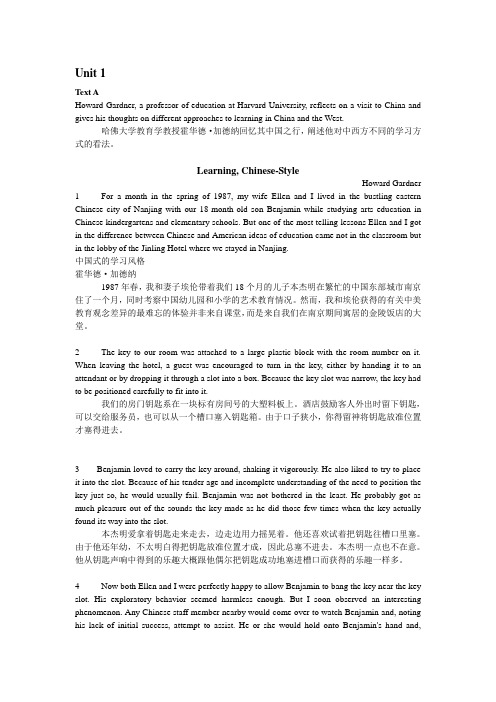
Unit 1Text AHoward Gardner, a professor of education at Harvard University, reflects on a visit to China and gives his thoughts on different approaches to learning in China and the West.哈佛大学教育学教授霍华德·加德纳回忆其中国之行,阐述他对中西方不同的学习方式的看法。
Learning, Chinese-StyleHoward Gardner 1 For a month in the spring of 1987, my wife Ellen and I lived in the bustling eastern Chinese city of Nanjing with our 18-month-old son Benjamin while studying arts education in Chinese kindergartens and elementary schools. But one of the most telling lessons Ellen and I got in the difference between Chinese and American ideas of education came not in the classroom but in the lobby of the Jinling Hotel where we stayed in Nanjing.中国式的学习风格霍华德·加德纳1987年春,我和妻子埃伦带着我们18个月的儿子本杰明在繁忙的中国东部城市南京住了一个月,同时考察中国幼儿园和小学的艺术教育情况。
然而,我和埃伦获得的有关中美教育观念差异的最难忘的体验并非来自课堂,而是来自我们在南京期间寓居的金陵饭店的大堂。
全新版大学英语综合教程2课文原文及翻译
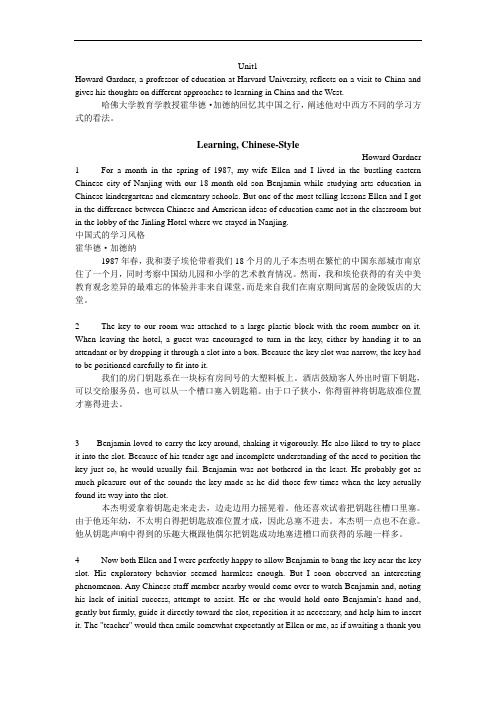
Unit1Howard Gardner, a professor of education at Harvard University, reflects on a visit to China and gives his thoughts on different approaches to learning in China and the West.哈佛大学教育学教授霍华德·加德纳回忆其中国之行,阐述他对中西方不同的学习方式的看法。
Learning, Chinese-StyleHoward Gardner 1 For a month in the spring of 1987, my wife Ellen and I lived in the bustling eastern Chinese city of Nanjing with our 18-month-old son Benjamin while studying arts education in Chinese kindergartens and elementary schools. But one of the most telling lessons Ellen and I got in the difference between Chinese and American ideas of education came not in the classroom but in the lobby of the Jinling Hotel where we stayed in Nanjing.中国式的学习风格霍华德·加德纳1987年春,我和妻子埃伦带着我们18个月的儿子本杰明在繁忙的中国东部城市南京住了一个月,同时考察中国幼儿园和小学的艺术教育情况。
然而,我和埃伦获得的有关中美教育观念差异的最难忘的体验并非来自课堂,而是来自我们在南京期间寓居的金陵饭店的大堂。
全新版大学英语综合教程2课文原文及翻译.pdf
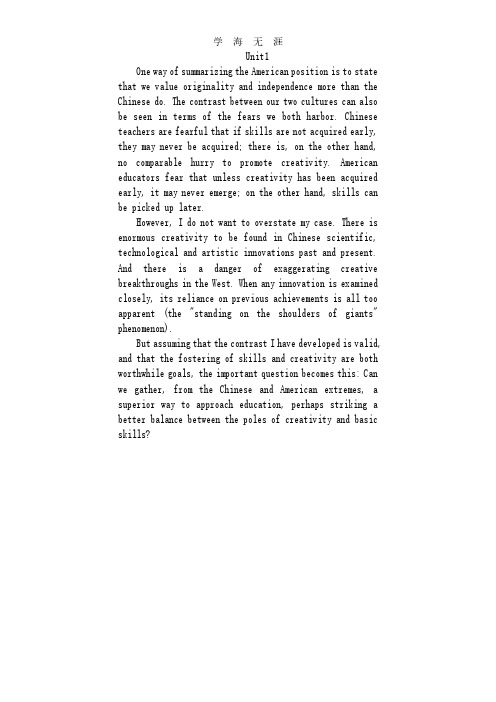
One way of summarizing the American position is to state that we value originality and independence more than the Chinese do. The contrast between our two cultures can also be seen in terms of the fears we both harbor. Chinese teachers are fearful that if skills are not acquired early, they may never be acquired; there is, on the other hand, no comparable hurry to promote creativity. American educators fear that unless creativity has been acquired early, it may never emerge; on the other hand, skills can be picked up later.However, I do not want to overstate my case. There is enormous creativity to be found in Chinese scientific, technological and artistic innovations past and present. And there is a danger of exaggerating creative breakthroughs in the West. When any innovation is examined closely, its reliance on previous achievements is all too apparent (the "standing on the shoulders of giants" phenomenon).But assuming that the contrast I have developed is valid, and that the fostering of skills and creativity are both worthwhile goals, the important question becomes this: Can we gather, from the Chinese and American extremes, a superior way to approach education, perhaps striking a better balance between the poles of creativity and basic skills?Walton set up a college scholarship fund for employees' children, a disaster relief fund to rebuild employee homes damaged by fires, floods, tornadoes, and the like. He believed in cultivating ideas and rewarding success."He'd say, 'That fellow worked hard, let's give him a little extra,'" recalls retired president Ferold F. Arend, who was stunned at such generosity after the stingy employer he left to join Wal-Mart. "I had to change my way of thinking when I came aboard.""The reason for our success," says Walton, in a company handout, "is our people and the way they're treated and the way they feel about their company. They believe things are different here, but they deserve the credit."Adds company lawyer Jim Hendren: "I've never seen anyone yet who worked for him or was around him for any length of time who wasn't better off. And I don't mean just financially, although a lot of people are. It's just something about him -- coming into contact with Sam Walton just makes you a better person."Making the journey from log cabin to White House is part of the American Dream. But when Jimmy Carter was defeated in his attempt to gain a second term as President of the United States he found himself suddenly thrown out of the White House and back in his log cabin. This is how he coped.SEAN: If that sort of thing happened only once in a while, it wouldn't be so bad. Overall, I wouldn't want to trade my dad for anyone else's. He loves us kids and Mom too. But I think that's sometimes the problem. He wants to do things for us, things he thinks are good. But he needs to give them more thought because:SEAN, HEIDI and DIANE: (In unison) Father knows better!(The lights quickly fade to black and then come up a second or two later. DIANE stands alone at the Down Right edge of the stage. HEIDI and SEAN enter Down Left and cross to the edge of the stage. )DIANE: Can you imagine how humiliated I was? An honor student, class president. And Father was out asking people to have their sons call and ask me to the prom! But that's dear old dad. Actually, he is a dear. He just doesn't stop to think. And it's not just one of us who've felt the heavy hand of interference. Oh, no, all three of us live in constant dread knowing that at any time disaster can strike because: Father knows better.I'd never realized how important daily routine is: dressing for work, sleeping normal hours. I'd never thought I relied so much on co-workers for company. I began to understand why long-term unemployment can be so damaging, why life without an externally supported daily plan can lead to higher rates of drug abuse, crime, suicide.To restore balance to my life, I force myself back into the real world. I call people, arrange to meet with the few remaining friends who haven't fled New York City. I try to at least get to the gym, so as to set apart the weekend from the rest of my week. I arrange interviews for stories, doctor's appointments -- anything to get me out of the house and connected with others.But sometimes being face to face is too much. I see a friend and her ringing laughter is intolerable -- the noise of conversation in the restaurant, unbearable. I make my excuses and flee. I re-enter my apartment and run to the computer as though it were a place of safety.I click on the modem, the once-annoying sound of the connection now as pleasant as my favorite tune. I enter my password. The real world disappears.Thought you were safe sharing secrets with Internet friends? Wait for the doorbell...The runway felt different this time. It startled him for a brief moment. Then it all hit him like a wet bale of hay. The bar was set at nine inches higher than his personal best. That's only one inch off the National record, he thought. The intensity of the moment filled his mind with anxiety. He began shaking the tension. It wasn't working. He became more tense. Why was this happening to him now, he thought. He began to get nervous. Afraid would be a more accurate description. What was he going to do? He had never experienced these feelings. Then out of nowhere, and from the deepest depths of his soul, he pictured his mother. Why now? What was his mother doing in his thoughts at a time like this? It was simple. His mother always used to tell him when you felt tense, anxious or even scared, take deep breaths.So he did. Along with shaking the tension from his legs, he gently laid his pole at his feet. He began to stretch out his arms and upper body. The light breeze that was once there was now gone. He carefully picked up his pole. He felt his heart pounding. He was sure the crowd did, too. The silence was deafening. When he heard the singing of some distant birds in flight, he knew it was his time to fly.Racing the clock every day is such an exhausting effort that when I actually have a few free moments, I tend to collapse. Mostly I sink into a chair and stare into space while I imagine how lovely life would be if only I possessed the organizational skills and the energy of my superheroines. In fact, I waste a good deal of my spare time just worrying about what other women are accomplishing in theirs. Sometimes I think that these modern fairy tales create as many problems for women as the old stories that had us biding our time for the day our prince would come.Yet superwomen tales continue to charm me. Despite my friend's warning against being taken in, despite everything I've learned, I find that I'm not only willing, but positively eager to buy that bridge she mentioned. Why? I suppose it has something to do with the appeal of an optimistic approach to life -- and the fact that extraordinary deeds have been accomplished by determined individuals who refused to believe that "you can't" was the final word on their dreams.Men have generally been assured that achieving their heart's desires would be a piece of cake. Women, of course, have always believed that we can't have our cake and eat it too-the old low-dream diet. Perhaps becoming a superwoman is an impossible dream for me, but life without that kind of fantasy is as unappealing as a diet with no treats.1) The young woman described to the policemen the way the man ran up to her and grabbed the bag from her hand. 2) All the people working for Sam Walton admire the way he manages Wal-Mart and the way he treats his employees. 3) The neighbors were disgusted at the way he talked to his old father.4) It's amazing the way the eight-year-old boy managed to stay so calm when he faced the emergency.1. You will find yourself penniless in a month.2. He found himself lying in a hospital ward.3. She found herself faced with the toughest job she had ever taken.4. Susan found herself in a trap from which she could not escape.1) Obviously what the speaker wanted to emphasize was the impact of these findings rather than the process that led to these findings.2) It seems that he is never bothered about what people would think about his behavior.3) The CEO never hesitates to let his employees know what he is planning for the company.4) The scientist will show the audience what a tele-operated robot can do for a family.5)Despite all this she manages to get her act together.1、She herself believed in freedom,so much so that she would rather die than live without it.2、Assuming the proposal is accepted,where are we going to get the money?3、Only by rewarding success can you bring out the best in your employess.4、It’s amazing the eight-year-old boy managed to stay so calm when he faced the emergency.5、Allen should have known better than to lend such a large sum of money to that untrustworthy cousin of his.。
全新版大学英语(第二版)综合教程2课文翻译
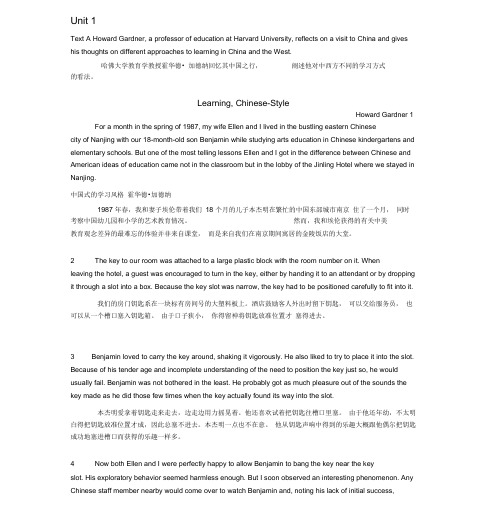
Unit 1Text A Howard Gardner, a professor of education at Harvard University, reflects on a visit to China and gives his thoughts on different approaches to learning in China and the West.哈佛大学教育学教授霍华德• 加德纳回忆其中国之行,阐述他对中西方不同的学习方式的看法。
Learning, Chinese-StyleHoward Gardner 1 For a month in the spring of 1987, my wife Ellen and I lived in the bustling eastern Chinesecity of Nanjing with our 18-month-old son Benjamin while studying arts education in Chinese kindergartens and elementary schools. But one of the most telling lessons Ellen and I got in the difference between Chinese and American ideas of education came not in the classroom but in the lobby of the Jinling Hotel where we stayed in Nanjing.中国式的学习风格霍华德•加德纳1987 年春,我和妻子埃伦带着我们18 个月的儿子本杰明在繁忙的中国东部城市南京住了一个月,同时考察中国幼儿园和小学的艺术教育情况。
然而,我和埃伦获得的有关中美教育观念差异的最难忘的体验并非来自课堂,而是来自我们在南京期间寓居的金陵饭店的大堂。
全新版大学英语第二版综合教程2课文翻译

全新版大学英语第二版综合教程2课文翻译《全新版大学英语第二版综合教程 2》中的课文涵盖了丰富多样的主题和内容,为学习者提供了广泛的语言输入和文化视角。
以下是对部分课文的翻译,希望能对您的学习有所帮助。
课文一:《成长》这篇课文讲述了一个年轻人在成长过程中的经历和感悟。
“当我还是个孩子的时候,世界似乎总是充满了奇迹和神秘。
每一天都是一次新的冒险,每一个角落都隐藏着未知的惊喜。
”“随着年龄的增长,我开始意识到生活并非总是如我所愿。
困难和挫折接踵而至,曾经的梦想似乎变得遥不可及。
”“然而,正是在这些艰难的时刻,我学会了坚持和努力。
我明白了成功并非一蹴而就,而是需要付出持续不断的努力。
”“成长让我懂得了珍惜身边的人和事,也让我更加勇敢地面对未来的挑战。
”课文二:《友谊》“真正的友谊是一种珍贵的财富,它能在我们最需要的时候给予支持和安慰。
”“朋友是那些在你犯错时,不会嘲笑你,而是帮助你改正错误的人。
他们会在你成功时为你欢呼,在你失败时给你鼓励。
”“友谊不是建立在利益和交换之上,而是基于真诚、信任和相互理解。
一个真正的朋友会倾听你的心声,与你分享快乐和悲伤。
”“在这个快节奏的现代社会中,我们常常忙于工作和生活,忽略了与朋友的联系。
但当我们回首往事,会发现真正的友谊是那些经得起时间考验的情感纽带。
”课文三:《文化差异》“不同的国家和民族有着独特的文化,这些文化差异在日常生活的方方面面都有所体现。
”“饮食文化就是一个明显的例子。
在中国,人们喜欢围坐在一张大桌子旁共享美食;而在西方国家,分餐制更为常见。
”“礼仪方面的差异也不容忽视。
在某些文化中,直接的眼神接触被视为尊重;而在另一些文化中,可能会被认为是不礼貌的。
”“理解和尊重文化差异是促进跨文化交流和建立和谐世界的关键。
只有当我们摒弃偏见,以开放的心态去学习和欣赏其他文化时,才能真正实现文化的交融与共同发展。
”课文四:《科技与生活》“科技的飞速发展给我们的生活带来了翻天覆地的变化。
全新版大学英语(第二版)综合教程2课文背诵段落原文及翻译1-5单元完整版.doc
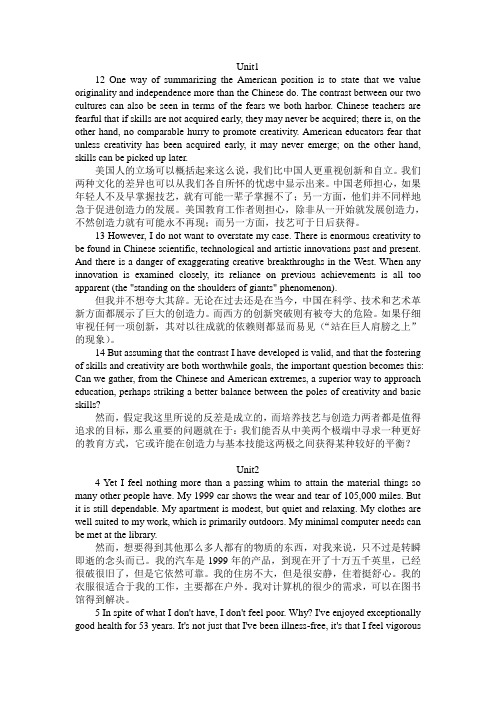
Unit112 One way of summarizing the American position is to state that we value originality and independence more than the Chinese do. The contrast between our two cultures can also be seen in terms of the fears we both harbor. Chinese teachers are fearful that if skills are not acquired early, they may never be acquired; there is, on the other hand, no comparable hurry to promote creativity. American educators fear that unless creativity has been acquired early, it may never emerge; on the other hand, skills can be picked up later.美国人的立场可以概括起来这么说,我们比中国人更重视创新和自立。
我们两种文化的差异也可以从我们各自所怀的忧虑中显示出来。
中国老师担心,如果年轻人不及早掌握技艺,就有可能一辈子掌握不了;另一方面,他们并不同样地急于促进创造力的发展。
美国教育工作者则担心,除非从一开始就发展创造力,不然创造力就有可能永不再现;而另一方面,技艺可于日后获得。
13 However, I do not want to overstate my case. There is enormous creativity to be found in Chinese scientific, technological and artistic innovations past and present. And there is a danger of exaggerating creative breakthroughs in the West. When any innovation is examined closely, its reliance on previous achievements is all too apparent (the "standing on the shoulders of giants" phenomenon).但我并不想夸大其辞。
全新版大学英语第二版综合教程2课文译文

课文译文UNIT 1TextA中国式的学习风格1987年春,我和妻子埃伦带着我们18个月的儿子本杰明在繁忙的中国东部城市住了一个月,同时考察中国幼儿园和小学的艺术教育情况。
然而,我和埃伦获得的有关中美教育观念差异的最难忘的体验并非来自课堂,而是来自我们在期间寓居的金陵饭店堂。
我们的房门钥匙系在一块标有房间号的大塑料板上。
酒店鼓励客人外出时留下钥匙,可以交给服务员,也可以从一个槽口塞入钥匙箱。
由于口子狭小,你得留神将钥匙放准位置才塞得进去。
本杰明爱拿着钥匙走来走去,边走边用力摇晃着。
他还喜欢试着把钥匙往槽口里塞。
由于他还年幼,不太明白得把钥匙放准位置才成,因此总塞不进去。
本杰明一点也不在意。
他从钥匙声响中得到的乐趣大概跟他偶尔把钥匙成功地塞进槽口而获得的乐趣一样多。
我和埃伦都满不在乎,任由本杰明拿着钥匙在钥匙箱槽口鼓捣。
他的探索行为似乎并无任何害处。
但我很快就观察到一个有趣的现象。
饭店里任何一个中国工作人员若在近旁,都会走过来看着本杰明,见他初试失败,便都会试图帮忙。
他们会轻轻握牢本杰明的手,直接将它引向钥匙槽口,进行必要的重新定位,并帮他把钥匙插入槽口。
然后那位“老师”会有所期待地对着我和埃伦微笑,似乎等着我们说声——偶尔他会微微皱眉,似乎觉得我俩没有尽到当父母的责任。
我很快意识到,这件小事与我们在中国要做的工作直接相关:考察儿童早期教育(尤其是艺术教育)的方式,揭示中国人对创造性活动的态度。
因此,不久我就在与中国教育工作者讨论时谈起了钥匙槽口一事。
两种不同的学习方式我的中国同行,除了少数几个人外,对此事的态度与金陵饭店工作人员一样。
既然大人知道怎么把钥匙塞进槽口——这是走近槽口的最终目的,既然孩子还很年幼,还没有灵巧到可以独自完成要做的动作,让他自己瞎折腾会有什么好处呢?他很有可能会灰心丧气发脾气——这当然不是所希望的结果。
为什么不教他怎么做呢?他会高兴,他还能早些学会做这件事,进而去学做更复杂的事,如开门,或索要钥匙——这两件事到时候同样可以(也应该)示给他看。
全新版大学英语第二版综合教程2课文及翻译

全新版大学英语第二版综合教程2课文及翻译全新版大学英语第二版综合教程 2 是许多大学生在英语学习道路上的重要教材。
这本教程的课文涵盖了丰富多样的主题,从日常生活到学术研究,从文化传统到社会现象,为学生提供了广阔的知识视野和语言学习素材。
在“Unit 1 Ways of Learning”中,课文通过讲述一位父亲试图教导儿子骑自行车的经历,探讨了不同的学习方式和理念。
父亲坚持按照自己的方法指导儿子,却未能成功。
最终儿子通过自己的摸索和尝试,掌握了骑车的技巧。
这篇课文让我们明白,每个人都有适合自己的学习方式,有时候放手让学习者自己去探索和尝试,可能会取得更好的效果。
“Unit 2 Values”里的课文则聚焦于价值观的讨论。
通过描述不同人物在面对利益和道德抉择时的表现,引导学生思考什么是真正重要的价值观。
例如,在商业世界中,是追求短期的利润最大化,还是坚守诚信和社会责任?这样的思考有助于学生在成长过程中树立正确的价值观,做出符合自己内心信念的选择。
“Unit 3 The Generation Gap”探讨了代际之间的差异和沟通问题。
课文中描绘了父母与子女在观念、生活方式和目标追求上的种种不同,以及由此产生的矛盾和冲突。
然而,也指出了通过理解、尊重和积极的沟通,代际之间可以跨越鸿沟,建立更加和谐的关系。
在翻译这些课文时,需要准确把握原文的意思,同时要考虑到中英文语言习惯和文化背景的差异。
例如,在一些具有特定文化内涵的词汇和表达上,不能简单地进行字面翻译,而要进行适当的解释和转换,以使译文更符合目标语言的读者的理解。
以“Unit 4 The Virtual World”中的一段为例:“The Internet has transformed how we communicate, do business, and access information Ithas opened up a world of possibilities, but it has also brought along new challenges and concerns” 翻译为“互联网改变了我们交流、做生意和获取信息的方式。
全新版大学英语(第二版)综合教程2课文及翻译

全新版大学英语(第二版)综合教程2课文及翻译Unit1Howard Gardner, a professor of education at Harvard University, reflects on a visit to China and gives his thoughts on different approaches to learning in China and the West.哈佛大学教育学教授霍华德加德纳回忆其中国之行,阐述他对中西方不同的学习方式的看法。
Learning, Chinese-StyleHoward Gardner1 For a month in the spring of 1987, my wife Ellen and I lived in the bustling eastern Chinese city of Nanjing with our 18-month-old son Benjamin while studying arts education in Chinese kindergartens and elementary schools. But one of the most telling lessons Ellen and I got in the difference between Chinese and American ideas of education came not in the classroom but in the lobby of the Jinling Hotel where we stayed in Nanjing.中国式的学习风格霍华德加德纳1987年春,我和妻子埃伦带着我们18个月的儿子本杰明在繁忙的中国东部城市南京住了一个月,同时考察中国幼儿园和小学的艺术教育情况。
然而,我和埃伦获得的有关中美教育观念差异的最难忘的体验并非来自课堂,而是来自我们在南京期间寓居的金陵饭店的大堂。
- 1、下载文档前请自行甄别文档内容的完整性,平台不提供额外的编辑、内容补充、找答案等附加服务。
- 2、"仅部分预览"的文档,不可在线预览部分如存在完整性等问题,可反馈申请退款(可完整预览的文档不适用该条件!)。
- 3、如文档侵犯您的权益,请联系客服反馈,我们会尽快为您处理(人工客服工作时间:9:00-18:30)。
BOOK2课文译文UNIT1TextA中国式的学习风格1987年春,我和妻子埃伦带着我们18个月的儿子本杰明在繁忙的中国东部城市南京住了一个月,同时考察中国幼儿园和小学的艺术教育情况。
然而,我和埃伦获得的有关中美教育观念差异的最难忘的体验并非来自课堂,而是来自我们在南京期间寓居的金陵饭店堂。
我们的房门钥匙系在一块标有房间号的大塑料板上。
酒店鼓励客人外出时留下钥匙,可以交给服务员,也可以从一个槽口塞入钥匙箱。
由于口子狭小,你得留神将钥匙放准位置才塞得进去。
本杰明爱拿着钥匙走来走去,边走边用力摇晃着。
他还喜欢试着把钥匙往槽口里塞。
由于他还年幼,不太明白得把钥匙放准位置才成,因此总塞不进去。
本杰明一点也不在意。
他从钥匙声响中得到的乐趣大概跟他偶尔把钥匙成功地塞进槽口而获得的乐趣一样多。
我和埃伦都满不在乎,任由本杰明拿着钥匙在钥匙箱槽口鼓捣。
他的探索行为似乎并无任何害处。
但我很快就观察到一个有趣的现象。
饭店里任何一个中国工作人员若在近旁,都会走过来看着本杰明,见他初试失败,便都会试图帮忙。
他们会轻轻握牢本杰明的手,直接将它引向钥匙槽口,进行必要的重新定位,并帮他把钥匙插入槽口。
然后那位“老师”会有所期待地对着我和埃伦微笑,似乎等着我们说声谢谢——偶尔他会微微皱眉,似乎觉得我俩没有尽到当父母的责任。
我很快意识到,这件小事与我们在中国要做的工作直接相关:考察儿童早期教育(尤其是艺术教育)的方式,揭示中国人对创造性活动的态度。
因此,不久我就在与中国教育工作者讨论时谈起了钥匙槽口一事。
两种不同的学习方式我的中国同行,除了少数几个人外,对此事的态度与金陵饭店工作人员一样。
既然大人知道怎么把钥匙塞进槽口——这是走近槽口的最终目的,既然孩子还很年幼,还没有灵巧到可以独自完成要做的动作,让他自己瞎折腾会有什么好处呢?他很有可能会灰心丧气发脾气——这当然不是所希望的结果。
为什么不教他怎么做呢?他会高兴,他还能早些学会做这件事,进而去学做更复杂的事,如开门,或索要钥匙——这两件事到时候同样可以(也应该)示范给他看。
我俩颇为同情地听着这一番道理,解释道,首先,我们并不在意本杰明能不能把钥匙塞进钥匙的槽口。
他玩得开心,而且在探索,这两点才是我们真正看重的。
但关键在于,在这个过程中,我们试图让本杰明懂得,一个人是能够很好地自行解决问题的。
这种自力更生的精神是美国中产阶级最重要的一条育儿观。
如果我们向孩子演示该如何做某件事——把钥匙塞进钥匙槽口也好,画只鸡或是弥补某种错误行为也好——那他就不太可能自行想方设法去完成这件事。
从更广泛的意义上说,他就不太可能——如美国人那样——将人生视为一系列的情境,在这些情境中,一个人必须学会独立思考,学会独立解决问题,进而学会发现需要创造性地加以解决的新问题。
把着手教回想起来,当时我就清楚地意识到,这件事正是体现了问题的关键之所在——而且不仅仅是一种意义上的关键之所在。
这件事表明了我们两国在教育和艺术实践上的重要差异。
那些善意的中国旁观者前来帮助本杰明时,他们不是简单地像我可能会做的那样笨拙地或是犹犹豫豫地把他的手往下推。
相反,他们极其熟练地、轻轻地把他引向所要到达的确切方向。
我逐渐认识到,这些中国人不是简单地以一种陈旧的方式塑造、引导本杰明的行为:他们是在恪守中国传统,把着手教,教得本杰明自己会愉快地要求再来一次。
学习应通过不间断的精心塑造与引导而得以实现,这一观念同样适用于艺术。
我们观看了孩子们在教室里学习艺术的情景,他们的娴熟技艺令我们惊讶。
年仅5、6岁的孩子就带着成人的那种技巧与自信在画花、画鱼和动物;9岁、10岁的小书法家写出的作品满可以在博物馆展示。
有一次去两位小艺术家的家里参观,我们从孩子的父母处得知,他们每天练习数小时以完善他们的技艺。
创造力第一?从对创造力的态度来说,优先次序似乎是颠倒了:西方的年轻人先是大胆创新,然后逐渐深谙传统;而中国的年轻人则几乎离不开传统,但是,随着时间的推移,他们同样可能发展到具有创新的境界。
美国人的立场可以概括起来这么说,我们比中国人更重视创新和自立。
我们两种文化的差异也可以从我们各自所怀的忧虑中显示出来。
中国老师担心,如果年轻人不及早掌握技艺,就有可能一辈子掌握不了;另一方面,他们并不同样地急于促进创造力的发展。
美国教育工作者则担心,除非从一开始就发展创造力,不然创造力就有可能永不再现;而另一方面,技艺可于日后获得。
但我并不想夸大其辞。
无论在过去还是在当今,中国在科学、技术和艺术革新方面都展示了巨大的创造力。
而西方的创新突破则有被夸大的危险。
如果仔细审视任何一项创新,其对以往成就的依赖则都显而易见(“站在巨人肩膀之上”的现象)。
然而,假定我这里所说的反差是成立的,而培养技艺与创造力两者都是值得追求的目标,那么重要的问题就在于:我们能否从中美两个极端中寻求一种更好的教育方式,它或许能在创造力与基本技能这两极之间获得某种较好的平衡?TextB孩子与金钱当家长觉得该教孩子们懂得如何对待金钱的时候,他们通常先为孩子开个储蓄账户。
刚开始的时候,孩子们颇感兴趣,因为他们想自己什么也不干银行还会付给他们钱,可当他们明白利率小得很,而且父母也无意让他们动用本金时,他们的热情一下子就冷却了。
对一个孩子来说,一个储蓄账户只不过是一个吞没其生日礼金支票的黑洞。
孩子:“奶奶给了我25美元!”家长:“太棒了。
咱们把支票直接存到你的账户上去。
”孩子:“可这钱她是给我的!我要用!”家长:“嗳,钱还是你的嘛。
你只不过是要把钱放在银行里,好让它增多。
”孩子(狐疑地):“你说‘增多’是什么意思?”家长:“哦,要是你把这25美元在银行里放一年,银行就会付给你75美分。
要是你连本带利在银行里再放一年,银行会再付给你75美分,另加2.5美分。
这叫做复利。
这钱能帮你上大学。
”这类储蓄计划的主要缺陷在于,孩子本人一无所获。
上大学还不知要过多少年,他们或许会想他们宁愿呆在家里。
实际上,这类计划的真正目的通常不是促进储蓄而是限制消费。
孩子们在糖果、电子游戏上的花费之大令家长们十分震惊(或者更确切地说,孩子们的超支行为似乎是在竭力仿效父母,这令家长们十分震惊),于是家长便设法把孩子们的钱存起来不让用。
毋怪乎孩子们很快就认定,大额钱款不是实实在在的钱,有了现钱要么赶紧花掉,要么藏在抽屉里。
为了避免我的两个孩子产生这一问题,我开设了自己的银行,名叫戴夫第一国家银行。
我用记录自己支票簿使用情况的同一个电脑程序给每个孩子开了一个账户。
因为我希望孩子存款增长的速度足以引起他们的注意,便给他们一个诱人的利率——月息5厘。
以复利计算,年息达到70%以上。
(不,我不接受外来存款。
)零花钱在每月第一天自动存入。
孩子们也可以把别的钱存进来,想存就存,想取就取。
戴夫银行经营了4年,一下子就把我的两个孩子变成了热心的储蓄者。
至今我儿子在车里找到零钱时仍会来找我说,“今天就把这个上账。
”两个孩子的存款增长很快,两年之后,我不得不将月利率降至3厘。
我宣布调低利率时两个孩子反对,可当我解释说供求法则同样适用于货币供应后,两人严肃地点头赞同。
两个孩子帮我一起计算他们的利息——这可是学习计算平均值与百分比的颇为有用的一课。
他们使用自己的资金我不加任何限制,不作任何询问,我还根据要求随时提供打印的账单。
高利率并非戴夫银行唯一诱人之处。
在孩子看来同样重要的是,他们的存款属于他们自己。
他们存钱便会获利;他们想花钱也用不着获得许可。
孩子对自己的钱没有自主权,就没有什么东西激励他们不去伸手要钱,不把到手的钱花个光。
帮助孩子们成为理性消费者的方法是,交给他们更多的,而不是更少的自主权。
我们去度假前,我通常额外多给孩子们20块钱左右存在他们账户上。
我告诉他们,他们可以在我们出发前用这笔额外的钱买T恤衫、存起来,或者花掉,或随便他们派什么别的用场——但在度假期间,他们就不会从我这儿再拿到任何额外的零用钱了(根据惯例被认为是度假享受的共同消费除外,如糖果、冰淇淋、电影票等)。
由于他们花费的任何一笔钱都是他们自己的而不是我的,他们出手时就很谨慎。
两年前的一个夏天,在玛莎葡萄园的一家纪念品商店,我儿子一声不响地仔细察看那些不起眼的商品,他的一个朋友则吵着让父母花5美元买了一把玩具枪,可几乎还没等我们回到车上,枪就坏了。
我儿子最后花了33美分买了个未打开的空心晶球,后来他用榔头把它砸了开来——我看这钱花得值得。
要是他花的是我的而不是他自己的钱,毫无疑问,他肯定也会要买一把玩具枪的。
儿童是天生的资本家。
只要给予足够的自由活动余地,他们很快就会成为精明的理财者。
如果家长的理财教育失败,那往往是因为他们出于自身的原因把存钱弄得似乎既痛苦又无聊。
金钱是有趣的,而且几乎完全是不讲自明的。
教育孩子们看问题要有长远目光的唯一途径,是让孩子们近期内便能尝到某种甜头,从而激励他们去那样做。
UNIT2TextA富足的一生首次面对这个问题,是在2003年12月初,我第一次为救世军摇铃募捐的时候。
当时我就站在沃尔玛商场入口处门外,对每一位向我的红壶里投入捐款的人都报以一声“谢谢”和一个微笑。
一位穿着整洁的妇人牵着她的幼子向放壶的台子走过来。
她在钱包里摸着找钱时,孩子抬头看了我一眼,问我:“你穷吗?”当时他眼里充满疑惑和好奇,时至今日仍历历在目。
“嗯,”我结结巴巴,边想边回答,“我比有些人拥有的多,但比其他人拥有的少。
”母亲因为孩子问了一个在社交上不该问的问题,训斥了他一顿,他俩便匆匆的赶去购物。
但是孩子的问题却一直留在我的心头挥之不去。
我从不认为自己“穷”,但有些事实我不可否认。
每当我填1040税务申报表时,我都属于收入最低的档次之一。
在过去的三十五年中,我只出去度过一次假。
我的电视机是黑白的,还是八年前别人送给我的。
然而,想要得到其他那么多人都有的物质的东西,对我来说,只不过是转瞬即逝的念头而已。
我的汽车是1999年的产品,到现在开了十万五千英里,已经很破很旧了,但是它依然可靠。
我的住房不大,但是很安静,住着挺舒心。
我的衣服很适合于我的工作,主要都在户外。
我对计算机的很少的需求,可以在图书馆得到解决。
尽管有些东西我没有,我并不感到贫穷。
这是为什么?五十三年来我一直非常健康。
我不但不生病,而且精力充沛,情绪饱满。
锻炼对我而言是确确实实的快事,我乐意长距离步行,越走越有劲。
我喜爱步行后随之产生的一种“什么都干得了”的心态。
我还十分珍惜我的创作才能。
当我写出美丽的诗句或编造出能把人逗乐的笑话时,我内心感到很富有。
通过写作而获得的洞察力,不断地令我惊奇。
而与那么多写作朋友交谈,是我乐趣的主要源泉之一。
但是在我生活中,有一个重要方面我并不那么富有。
在一个对物资财富的追求投入如此之多心力的社会中,我觉得很不自在。
我年轻时曾与一位非常有趣的女士谈过朋友。
